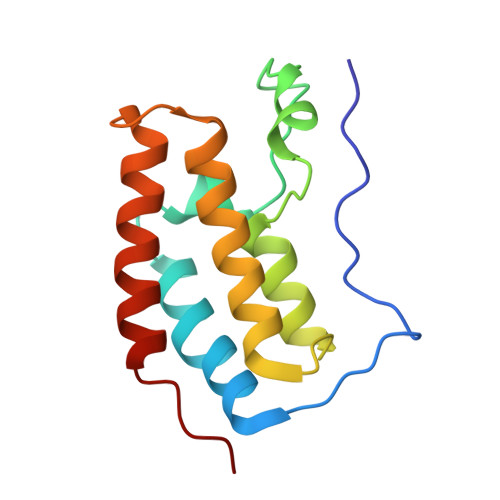Down-regulation of NF-{kappa}B Transcriptional Activity in HIV-associated Kidney Disease by BRD4 Inhibition.
Zhang, G., Liu, R., Zhong, Y., Plotnikov, A.N., Zhang, W., Zeng, L., Rusinova, E., Gerona-Nevarro, G., Moshkina, N., Joshua, J., Chuang, P.Y., Ohlmeyer, M., He, J.C., Zhou, M.M.(2012) J Biol Chem 287: 28840-28851
- PubMed: 22645123
- DOI: https://doi.org/10.1074/jbc.M112.359505
- Primary Citation of Related Structures:
2LSP, 4F3I - PubMed Abstract:
NF-κB-mediated inflammation is the major pathology in chronic kidney diseases, including HIV-associated nephropathy (HIVAN) that ultimately progresses to end stage renal disease. HIV infection in the kidney induces NF-κB activation, leading to the production of proinflammatory chemokines, cytokines, and adhesion molecules. In this study, we explored selective inhibition of NF-κB transcriptional activity by small molecule blocking NF-κB binding to the transcriptional cofactor BRD4, which is required for the assembly of the productive transcriptional complex comprising positive transcription elongation factor b and RNA polymerase II. We showed that our BET (Bromodomain and Extra-Terminal domain)-specific bromodomain inhibitor MS417, designed to block BRD4 binding to the acetylated NF-κB, effectively attenuates NF-κB transcriptional activation of proinflammatory genes in kidney cells treated with TNFα or infected by HIV. MS417 ameliorates inflammation and kidney injury in HIV-1 transgenic mice, an animal model for HIVAN. Our study suggests that BET bromodomain inhibition, targeting at the proinflammatory activity of NF-κB, represents a new therapeutic approach for treating NF-κB-mediated inflammation and kidney injury in HIVAN.
Organizational Affiliation:
Department of Structural and Chemical Biology, Mount Sinai School of Medicine, New York, New York 10029, USA.
















